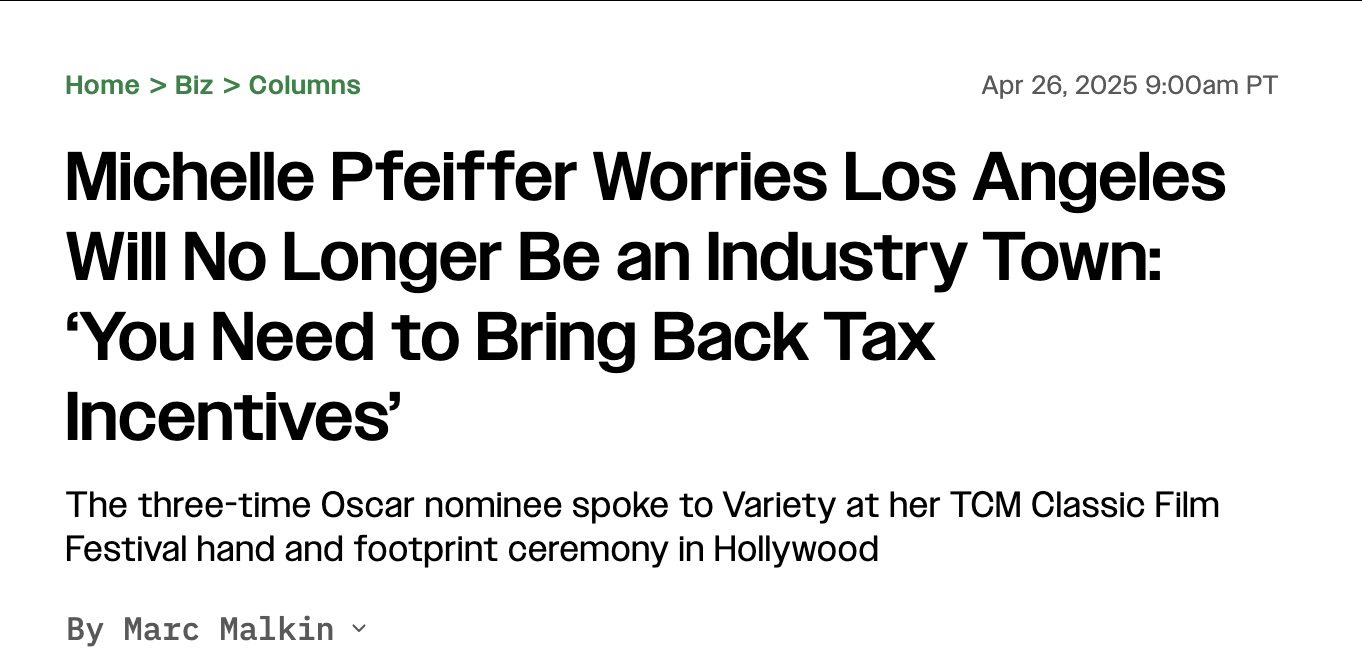Let's Talk About: Is "Content Creation" the new Commercial Arm of Hollywood?
It's TikTok this/creator economy that: LA is becoming Motor City but can "content creation" fill the production gap? Asking hard questions in today's post. Plus: are the tariffs in the room with us?
I’d had this week’s free post all mapped out when this bombshell dropped on Sunday and I could not leave it out of today’s post:
Yes, Hollywood is in trouble but this is abjectly a horrible idea. Why? Because it’s logistically unsound and unfounded and really? It’s fatuous.
It’s not thought out at all: at what phase do these “tariffs” take place? Are you not considering people use VPNS to view films? People understand now (finally) that tariffs are paid by the CONSUMER. So how will charging them MORE for movies and theater tickets incentivize them to get out of the house and watch movies and lift the industry up?
And let’s not forget… films are SERVICES, not GOODS, so explain how you levy tariffs on that?
I point out again, that the solution the Regan administration had in the 80s was to tie screen minimums to trade agreements, NOT levying taxes. See my Substack post from February:
Like everything this administration touches, it throws things into chaos and executives and lawmakers around the industry are scrambling to make sense of what, if anything this means, in a time when they should be focused on the real problems at hand and creating REAL solutions, not dissecting a distraction like this meant to keep their names in the press while we chase our tails.
But this is above my pay grade and I know we all have bills to pay and many of us are just treading water at the moment, so I’ll pull today’s newsletter back into focus with an exploration of a corner of production that’s actually thriving in the hopes that some of you reading can benefit from this and identify additional revenue streams for yourselves and your businesses.
You know… offering real solutions to problems for the people who need it most.
It’s important to remember that things move in cycles and that during periods of great upheaval, we’re challenged to dig deep and find the resolve we need to problem solve and carry on. - KLA Media Group
Is "Content Creation" the new Commercial Arm of Hollywood?
The list of headlines sounding the alarm has gone on and on and on and on…
As
said recently: Storytelling remains fundamental to entertainment. But who tells those stories and how is shifting.And more are below:
And it’s not just the consumer, it’s apparently where the jobs are going too:
The headlines are bleak and the warnings incessant. I’ve had multiple friends and colleagues throw in the towel recently and pack it in. It’s nerve wracking and hard to keep a brave face and a positive outlook.
But I’m reminded of a time way back when, when “other” kinds of content kept the wheels of the business going and I see a sliver of hope.
What I’m talking about of course, is the commercial industry and the question I want to ask is: can content creation and Hollywood work hand-in-hand to keep things afloat? Is it enough?
Is “Content” & “Influencing” The New Commercial Industry?
I was still in my teens when the SAG commercial strike happened in 2000, before SAG had merged with AFTRA to form SAG-AFTRA. And what fundamentally changed as a result of this strike was that commercials no longer had the whopping payouts that they once did. It used to be that an actor could float their entire year on the booking of one or two commercials, but no more.
People have a lot of things to say about this particular strike but what it ultimately accomplished was eroding advertisers desire / need to shoot union commercials. And anyone who has worked in Hollywood long enough knows that commercials are (and hopefully still are) a vital part of keeping people employed and paid in-between film and television shoots.
And if you remember, I did a post earlier this year how the platforms are basically reinventing the cable model after they succeeding in upending legacy Hollywood:
Is Hollywood Really Uncool? Really???
An episode of The Studio (amazing show) with Seth Rogen recently pitted his studio head character against a snooty doctor he was dating (played by Rebecca Hall). In the episode, he attends a charity dinner at Cedars Sinai with her equally self-important doctor friends who routinely dismiss his role as studio head as not being important and serious.
In the usual hijinks of the show, Matty gives it back to them in spades, and delivers a few truthisms about the nature of art: what is it, what is its place in the world and how it shapes the world around us.
Usually in those instances, you’re going to cheer for the doctors (who are in fact, saving lives) but as our own industry is on life-support at the moment, I found myself raucously cheering for Matty as he delivered the snark the doctors were serving right back to them.
The doctors painted the Studio as irrelevant and uncool, frivolous, but Matty pointed out that when patients are in the hospital recovering, what are they looking at?
A screen.
Film and television, however you want to spin it, remain an integral part of the fabric of our collective culture and I don’t see that ending any time soon.
But we cannot bury our heads in the sand and we must look at why things are they way they are now.
This Substack post from
got me thinking the other day, and I think there are a lot of truths in this piece as to WHY things are going the way they’re going at the moment.Kids don’t want to be filmmakers any more. If you ask Gen Z and Gen Alpha, all of them want to be influencers and creators, not filmmakers.
From a recent Fortune article:
Gone are the days of kids aspiring to be a ballerina, the president, or an astronaut—Gen Alpha wants the dream jobs of the digital era. They’ve swapped Neil Armstrong for MrBeast, and Serena Williams for Emma Chamberlain.
That’s because being a YouTuber is Gen Alpha’s top job aspiration. More than 30% of 12 to 15-year-olds say they want the career, according to a recent report from social commerce platform Whop. The gig is followed up by 21% of the kids aiming to become TikTok creators—another highly lucrative platform, launching the careers of million-dollar successes Addison Rae, Charli D’Amelio, and Khaby Lame.
It has to be said: if you want to save Hollywood, you have to bring back the allure and the prestige that was once part-and-parcel to the industry.
Working With What We’ve Got
During the lean times, filmmakers would focus on commercial production to pad their bank accounts and keep working. Screen grabs for the latest on-location film trackers from Film LA are below and show the dwindling amount of commercial production days shot in Los Angeles for the last few weeks:
To note, these are just the days that are tracked that have pulled permits with Film LA. Given the massive amount of volume that’s uploaded to YouTube and social media on a daily basis, I would venture to say that there are many, many more production days for videos designed for social media than are being tracked here.
Thinking Outside The Box

It’s important to remember that things move in cycles and that during periods of great upheaval, we’re challenged to dig deep and find the resolve we need to problem solve and carry on.
In the 1920s, sound was introduced to film, decimating the silent film market. Then came animation and shortly following, the studio system. Then came color pictures and shortly after that, television in the 1950s. Then came betamax and VHS, and BluRay and DVD. Then streamers and now, the digital era. The point that I’m making is that in each iteration of the film industry, the creatives within it have held true to the art form of good storytelling and somehow made it work. I believe, truly, that the film and television industry will survive, but we’re looking for its next iteration and while we’re doing that, we’ve got to think of ways to continue to harness the tools we have to our benefit.
If you’re a filmmaker, it might be a reasonable consideration to start sending your work to the talent and the agencies that represent social media influencers to drive work and develop relationships.
Call me long in tooth, but I still believe that many people get into work as an influencer or social media personality to make way for bigger and better things in their careers, and that includes television programs (scripted and not) and films.
It’s good to sound the alarms, but just as important is coming up with viable solutions to keep folks working in the interim.
This is just one idea to keep people working and lean into what seems to be a real source of revenue at present but I’d love to hear your thoughts as well in the comments!
Want to Work With Me?
I’d love to hear about your project! We’ll start with a 10-15 minute call or Zoom to discuss your project at no charge. Message me below to set something up or go to my website at www.KLAMediaGroup.com

















